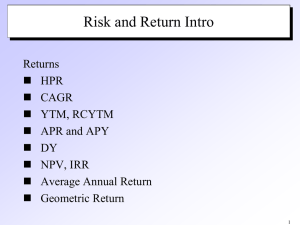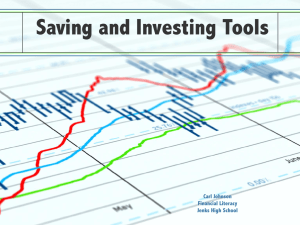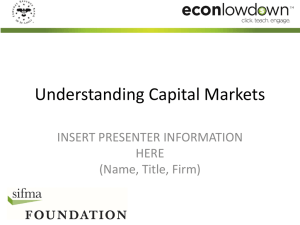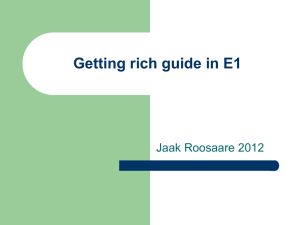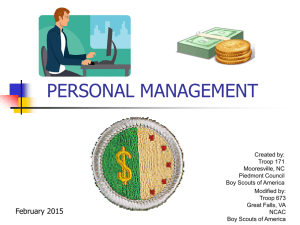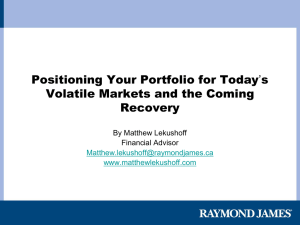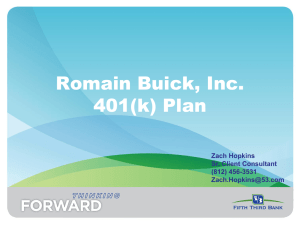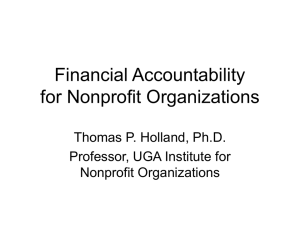Personal Management Merit Badge
advertisement
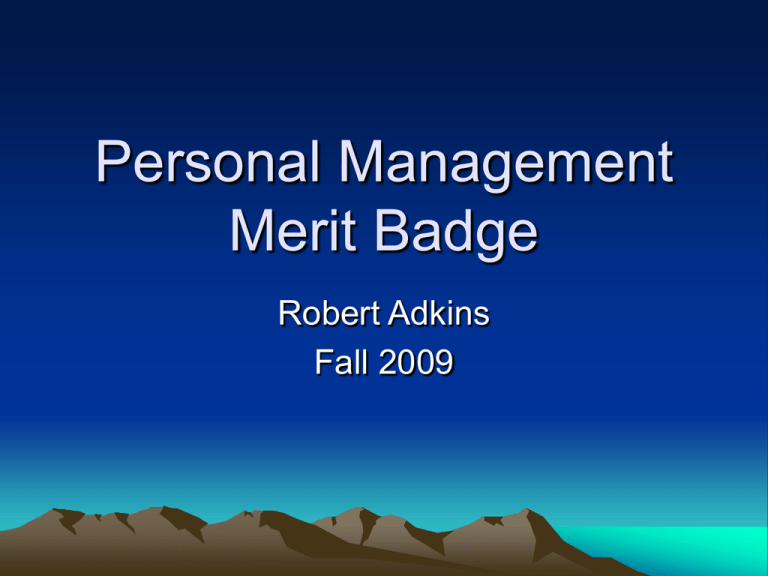
Personal Management Merit Badge Robert Adkins Fall 2009 Overview • What is Personal Management? • Badge Requirements (per 2007 Book) • Class one curriculum – – – – – Managing yourself Smart shopping Money, emotions, discernment, and discipline John Wesley: Biblical Thoughts on Money Budgeting overview and the 13-week project requirement – Risk and Return – Saving vs. Investing – Stocks: selecting 5 and tracking performance. Managing Yourself • Before you can effectively manage others, you must manage yourself effectively. – If you can’t manage your money, who would trust you with theirs. – Employers check potential employee’s credit scores. • Take yourself seriously • If you don’t know where you are going any road will get you there. Effective Personal Management • Requires setting of long term and short term goals. – Goals cascade and are interdependent. Achievement of long term goals may require completion of many short term goals. – Must have discipline to think, plan, and execute. – Keep list “alive.” (Revalidate long term list quarterly, Daily to do list.) – Satisfaction of accomplishment. Managing Yourself • Take responsibility for yourself and your actions. • Consider what adults do you now? – How will you meet your housing and food needs? – How will you meet your anticipated life style? • Much of your life is managed for you now. • Need to guide you toward success in the future. – Manage Resources: time, life, money. • Create a road map and prepare for life outside your parent’s house when you are on your own. Smart Shopping • Research what you want. Define function(s) • Look for sales (End of season) • Comparison shop at least 3 sources. – Check cost per unit. • Advertisements (new and improved; really?) – Try to push your emotion buttons to get you to buy. – Avoid bait and switch. • Consider alternatives • Warranties • Avoid impulse buying or shopping while hungry. – Focus on your savings goal to help yourself say, “No.” • If it sounds too good to be true, it probably is. . Control Impulse Buying • Advertisers try to tempt you to buy. – Envy – Entitled – Girls will like you • All of your emotions can influence your purchases. (But purchasing something does not change the reason that you feel the way you do.) – – – – Happy Sad Money can “burn a hole in your pocket.” Ever have “post purchase dissonance?” Shopping and Use of Credit • In general, avoid buying ordinary items on credit. • Avoid teaser rates that go up. • Better to save your money for something you want. • Learn to budget • Credit cards tend to have high interest and should be paid off in full monthly. • Avoid minimum payments that will keep you in debt and increase the total cost of the purchase. Money: Biblical Perspective John Wesley's 1760 Sermon The Use of Money (Credit: Jim Jackson) “Make all you can: Industry Deuteronomy 8:18 "...the Lord your God...gives you the power to get wealth" • Save all you can: Frugality Mark 8:34 "...deny yourself" • Give all you can: Generosity Acts 20:35 "It is more blessed (satisfying) to give than to receive" John Wesley's 1760 Sermon • Timothy 6:17-19 "As for those who in the present age are rich: command them not to be haughty, or to set their hopes on the uncertainty of riches, but rather on God who richly provides us with everything for our enjoyment. John Wesley's 1760 Sermon • They are to do good, to be rich in good works, generous, and ready to share, thus storing up for themselves the treasure of a good foundation for the future, so they take hold of the life that really is life.“ • Keep good records Proverbs 27:23 "Know well the condition of your flocks…, herds, for riches will not last forever." John Wesley's 1760 Sermon • What do you own? Assets What do you owe? Liabilities What do you make? Credits What do you spend? Debits • Have a responsible spending plan Proverb 21:5 "The plans of the diligent lead surely to abundance, but everyone who is hasty comes only to want" Isaiah 55:2 "Why do you spend your money...for that which does not satisfy?" John Wesley's 1760 Sermon • Live debt free Proverbs 22:7 "The borrower is a slave to the lender.” • Make sure God is in your budget Proverbs 3:9-10 "Honor the Lord with your substance and with the first fruit of all your produce; then your barns will be filled with plenty..." Learning to Manage Money • Monitor state of economy • Workforce changes • Fewer companies offer pensions. – You must save for retirement. • May have to have multiple employers over your life. Money Matters • Money skills must be learned. • If you don’t learn these skills: – Stress – Marital discord/dysfunction – Bad credit • No credit • Higher borrowing costs Money • Don’t have unlimited money: Finite resource. • Discuss emotions about money. • A Scout is Frugal: Makes smart money decisions. • Must make budget tradeoffs. – If revenue (money in) is down. • Discuss Options – If expenses (money out) is up. • Discuss Options Is Money the Most Important Thing in Life? • No! Consider: – Family, friends, religion, achieving personal growth. – But, not enough money can impact your health, well being, and relationships. • Discussion The Accounting Equation (Simplified) USES = SOURCES • Assets = Liabilities + Owner’s Equity • Assets: Something of value (It is a use of money.) – Cash, car, house, IPOD, stocks, bonds, etc. • Liabilities: Something that you owe – Note, bill, mortgage, etc. • Liabilities and owner’s equity are sources. • Therefore, Assets – Liabilities = Owner’s equity (What you own or your net worth.) The 13 Week Personal Budget Requirement • Set savings goal. • Over 13 Weeks, Track: – Revenues – Expenses – Net income • Use Excel or do so on paper. • Discuss tradeoffs and discipline to achieve goal. Budgeting • • • • Budget helps you manage your money. Organizes your finances. Fixed expenses vs. variable expenses Spend categories – Entertainment (too broad: break down) – Restaurants vs. groceries • Pay close attention to your discretionary spending. (ex. Candy bar after school or newly released video game.) Revenues (money in) • • • • • • • Allowance Extra chores Work part time Start a business Sell items you no longer need Save gift money Can you forecast revenues? Expenses (money out) • Analyze your forecasted (budgeted) and actual expenses. • What can you give up? – Are your fixed expenses really fixed? – Think outside the box. • Rent or share a video game instead of buying. • Get a book from a library instead of buying. • Other options – Change goal – Extend time – Opt for less expensive option Risk and Return • You must demand a commensurate return for the amount of risk. Generally, the higher the risk the higher the reward. Saving vs. Investing • Saving – Purpose is to keep money. – Paying yourself or setting aside money in a bank account or having on hand for an emergency. – Savings in a bank is guaranteed by the FDIC (Govt.) – Tend to have short term time horizon. • Investing – – – – – Purpose is to make money. Invest in a business (lawn mower) Invest in your education, skills, or trades. Invest in a financial instrument. (Stock, bond, mutual fund, etc.) Investing involves some risk of loss. (Generally, not guaranteed, and you may lose some or all of your money.) – Tend to be longer time horizon. – Remember to match the investment with the time horizon. Savings • • • • Pay yourself first Determine discretionary expenses Keep records Manage money to stay on track. – If expenses go up, do what? Discussion – If revenues go down, do what? Discussion Savings: Bank • • • • • • Insured by FDIC Low interest, but better than 0% interest. Low yields on checking and savings Watch fees (ATM, Over draft, checking account) Higher yields on CD and Money Markets CD requires money to be tied up for a specified period. (longer period = more interest.) • Debit Card: Draws money from your account. You must have money in the account for it to work. • Credit Card: Don’t have to have money in the account. Pay off each month due to high interest rates. Checking Accounts • Some pay interest on balance • Many banks charge fees on checking accounts. Shop around for best deals. • You must have money in the bank to cover your checks or debit card transactions. • Overdrafts are expensive: Avoid through good record keeping. Investments • Invest to make more money • Save to keep money. • Investments involve risk of losing money (principal.) • Invest in yourself – College – Obtain marketable skills Investment Types • Owned Investments (Equity Investments) – Stocks (a certificate of company ownership) • Share Appreciation (Greater fool theory) • Dividends (not guaranteed) • Value may decrease to $0. • Loaned Investments (Debt Instruments) – Bonds (IOU) Pay back principle plus interest. • Money Market (Low Risk) Maturities less than 1 year. • Savings Bonds (Zero Coupon, bought at discount to face value) • US Treasury Bonds (Low Risk: backed by US Taxpayers) • Corporate Bonds (Higher Risk: potential greater yield • Municipal Bonds (Low Risk: tax deferment increase return Common Investment Types • • • • • • Stock in US or Foreign Companies Mutual Funds (stocks or bonds) Real Estate (Land, houses, apartments) Personal Business Commodities (Think of examples.) Collectibles (Think of examples.) KEY: Match Your Investment with Your Time Horizon. • When you are younger you can assume more risk. • As you get older you need to reduce your risk. • The longer you have until you need your money the more risk you can incur. – Ex. If you are needing tuition in 2 years it should be saved not invested. • Diversification • Asset Allocation Bonds (Debt Instruments) • Common US Bonds – EE (Savings Bond) • • • • Zero Coupon Bought at discount from face value. Does not pay a coupon. Pays full face value at maturity. – I (Adjusts for inflation) • Adjusted every 6 months • Long term investment: penalty for redemption within 5 years of purchase. Stocks • Quality Growth Stocks – Leaders in its industry – Grow faster and more consistently than the economy as a whole. (But what if the company’s earnings disappoints? • Mutual Fund – Diversification across companies and asset classes. (Covariance) – Consider investment costs (loads, fees, commissions) – Consider suitability of fund’s investment goals for your time horizon. Stocks • Where to Buy Shares: Buy in Blocks of 100 Shares – – – – NYSE (Most capitalize companies) AMEX OTC: NASDAQ (Less capitalized companies) Pink sheets: Penny Stocks (Beware, some stocks are cheap for a reason.) • Set up an account at a brokerage (discount or full service) • You must be 18 to trade stocks, but may own through a custodial account. The Power of Compounding: The Power to Make You Rich • In principle you make interest on the interest. • Example with Excel spreadsheet. • Lesson: In investing time is your friend; you must start saving and investing when you are young. Selecting Stocks • Discuss how to find share prices and read and interpret stock data. • EX: Yahoo Financial • Wall Street Journal • Investor’s Business Daily Borrowing Money • Interest is the cost of money. • Cost = Principal X Rate X Time – The more you borrow, the higher the interest rate, and the longer you borrow the more you will pay. • Appropriate borrowing – College education – Buying a house • Inappropriate borrowing – Depreciable assets – Discretionary living expenses (eating out etc.) Borrowing Money • • • • • Shop around Compare Annual Percentage Rates What is the Total Cost of the Loan? What are the fees? Lowest payments per month may increase the total cost of the loan. • Is there a charge for early repayment? Credit Cards • • • • • Cards have charge limits Cards have high interest (>18%) and fees Should pay off balance each month. Avoid paying only the minimum payment Paying off your charge cards is like having an investment that pays the same interest of your credit card. • Avoid getting in over your head. (Especially when you go to college.) Planning Your Time • Know Your Vision • Have a Plan • Create “SMART” Goals to achieve your Plan – Specific – Measurable – Attainable – Relevant – Time-Based Insurance • In exchange for payments (premiums) insurance companies will pay you for a loss. • Pay to Offset Risk – Risk of a car crash: Car insurance – Risk of dying: Life insurance • Permanent Life – Generally more expensive – Includes an investment component that you can borrow against. – Cost stays the same • Term Life – Generally less expensive than whole life – Purchase for a term (like 5 years) – Cost may go up when renewing at next term. • Discuss when you will need insurance. Managing Your Time • Setting Priorities – Right Mix of Short and Long Term Goals • • • • • • • • • • Reward Yourself Schedule Relaxation Time Schedule Emergency Time Create a List: Check off Completed Tasks Schedule Your Most Difficult Tasks Be Flexible Ask for Help Eliminate Low Priority Items Say, “No.” Revaluate Goals Periodically Planning Exercise • Use Excel to Create a Plan • Use Outlook to Schedule Your Week. Planning Your Future • What do you want to do? • What education, skills, licenses do you need? • How much money do you want to make? • What are your interests? • Set up informational interviews with people that are successful in fields/industries that interest you. (Your ASMs can help set these up.)

